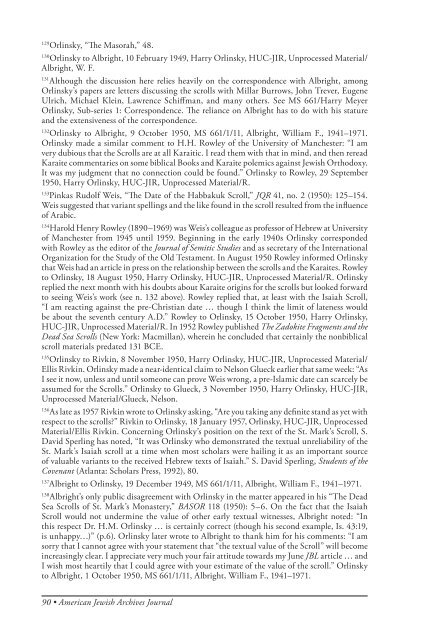The American Jewish Archives Journal, Volume LXI 2009, Number 1
The American Jewish Archives Journal, Volume LXI 2009, Number 1
The American Jewish Archives Journal, Volume LXI 2009, Number 1
Create successful ePaper yourself
Turn your PDF publications into a flip-book with our unique Google optimized e-Paper software.
129 Orlinsky, “<strong>The</strong> Masorah,” 48.<br />
130Orlinsky to Albright, 10 February 1949, Harry Orlinsky, HUC-JIR, Unprocessed Material/<br />
Albright, W. F.<br />
131Although the discussion here relies heavily on the correspondence with Albright, among<br />
Orlinsky’s papers are letters discussing the scrolls with Millar Burrows, John Trever, Eugene<br />
Ulrich, Michael Klein, Lawrence Schiffman, and many others. See MS 661/Harry Meyer<br />
Orlinsky, Sub-series 1: Correspondence. <strong>The</strong> reliance on Albright has to do with his stature<br />
and the extensiveness of the correspondence.<br />
132Orlinsky to Albright, 9 October 1950, MS 661/1/11, Albright, William F., 1941–1971.<br />
Orlinsky made a similar comment to H.H. Rowley of the University of Manchester: “I am<br />
very dubious that the Scrolls are at all Karaitic. I read them with that in mind, and then reread<br />
Karaite commentaries on some biblical Books and Karaite polemics against <strong>Jewish</strong> Orthodoxy.<br />
It was my judgment that no connection could be found.” Orlinsky to Rowley, 29 September<br />
1950, Harry Orlinsky, HUC-JIR, Unprocessed Material/R.<br />
133Pinkas Rudolf Weis, “<strong>The</strong> Date of the Habbakuk Scroll,” JQR 41, no. 2 (1950): 125–154.<br />
Weis suggested that variant spellings and the like found in the scroll resulted from the influence<br />
of Arabic.<br />
134Harold Henry Rowley (1890–1969) was Weis’s colleague as professor of Hebrew at University<br />
of Manchester from 1945 until 1959. Beginning in the early 1940s Orlinsky corresponded<br />
with Rowley as the editor of the <strong>Journal</strong> of Semitic Studies and as secretary of the International<br />
Organization for the Study of the Old Testament. In August 1950 Rowley informed Orlinsky<br />
that Weis had an article in press on the relationship between the scrolls and the Karaites. Rowley<br />
to Orlinsky, 18 August 1950, Harry Orlinsky, HUC-JIR, Unprocessed Material/R. Orlinsky<br />
replied the next month with his doubts about Karaite origins for the scrolls but looked forward<br />
to seeing Weis’s work (see n. 132 above). Rowley replied that, at least with the Isaiah Scroll,<br />
“I am reacting against the pre-Christian date … though I think the limit of lateness would<br />
be about the seventh century A.D.” Rowley to Orlinsky, 15 October 1950, Harry Orlinsky,<br />
HUC-JIR, Unprocessed Material/R. In 1952 Rowley published <strong>The</strong> Zadokite Fragments and the<br />
Dead Sea Scrolls (New York: Macmillan), wherein he concluded that certainly the nonbiblical<br />
scroll materials predated 131 BCE.<br />
135Orlinsky to Rivkin, 8 November 1950, Harry Orlinsky, HUC-JIR, Unprocessed Material/<br />
Ellis Rivkin. Orlinsky made a near-identical claim to Nelson Glueck earlier that same week: “As<br />
I see it now, unless and until someone can prove Weis wrong, a pre-Islamic date can scarcely be<br />
assumed for the Scrolls.” Orlinsky to Glueck, 3 November 1950, Harry Orlinsky, HUC-JIR,<br />
Unprocessed Material/Glueck, Nelson.<br />
136As late as 1957 Rivkin wrote to Orlinsky asking, “Are you taking any definite stand as yet with<br />
respect to the scrolls?” Rivkin to Orlinsky, 18 January 1957, Orlinsky, HUC-JIR, Unprocessed<br />
Material/Ellis Rivkin. Concerning Orlinsky’s position on the text of the St. Mark’s Scroll, S.<br />
David Sperling has noted, “It was Orlinsky who demonstrated the textual unreliability of the<br />
St. Mark’s Isaiah scroll at a time when most scholars were hailing it as an important source<br />
of valuable variants to the received Hebrew texts of Isaiah.” S. David Sperling, Students of the<br />
Covenant (Atlanta: Scholars Press, 1992), 80.<br />
137Albright to Orlinsky, 19 December 1949, MS 661/1/11, Albright, William F., 1941–1971.<br />
138Albright’s only public disagreement with Orlinsky in the matter appeared in his “<strong>The</strong> Dead<br />
Sea Scrolls of St. Mark’s Monastery,” BASOR 118 (1950): 5–6. On the fact that the Isaiah<br />
Scroll would not undermine the value of other early textual witnesses, Albright noted: “In<br />
this respect Dr. H.M. Orlinsky … is certainly correct (though his second example, Is. 43:19,<br />
is unhappy…)” (p.6). Orlinsky later wrote to Albright to thank him for his comments: “I am<br />
sorry that I cannot agree with your statement that “the textual value of the Scroll” will become<br />
increasingly clear. I appreciate very much your fair attitude towards my June JBL article … and<br />
I wish most heartily that I could agree with your estimate of the value of the scroll.” Orlinsky<br />
to Albright, 1 October 1950, MS 661/1/11, Albright, William F., 1941–1971.<br />
90 • <strong>American</strong> <strong>Jewish</strong> <strong>Archives</strong> <strong>Journal</strong>

















